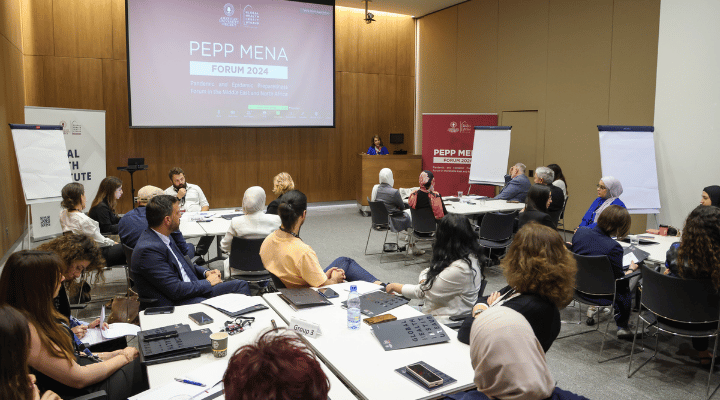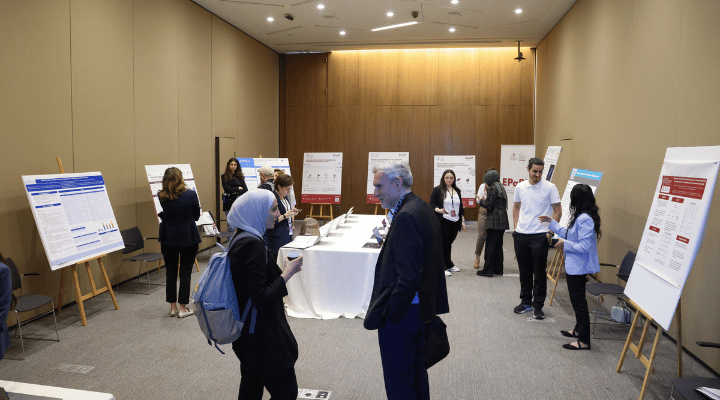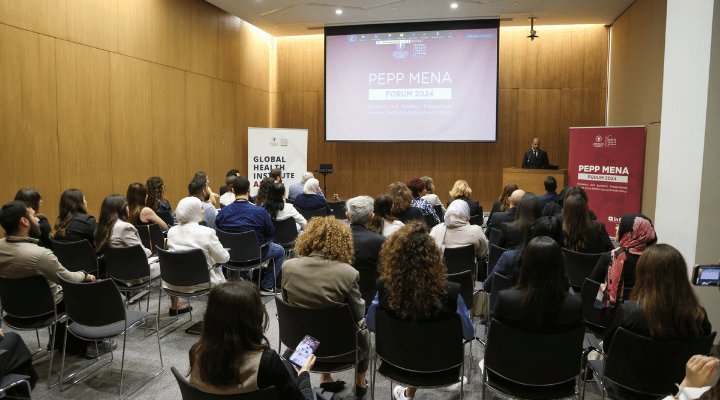GHI Holds the PEPP MENA Forum 2024 Dedicated to Advancing Epidemic and Pandemic Preparedness in the MENA Region
The Global Health Institute (GHI) at the American University of Beirut (AUB) hosted a two-day event titled “PEPP MENA Forum 2024: Priority Setting in the Context of Fragility”, an inaugural regional forum organized by the Epidemic and Pandemic Preparedness Program (EPaPP). The forum took place on April 22nd and 23rd, 2024, at the AUB campus, bringing together distinguished policymakers, global health experts, scholars, industry leaders, and participants from various humanitarian and global health community sectors to discuss challenges and opportunities for advancing epidemic and pandemic preparedness in the MENA region.
The forum commenced with opening remarks from Dr. Shadi Saleh, Founding Director of GHI, and Dr. Wessam El Beih, Regional Director for the Middle East and North Africa International Development Research Centre (IDRC). Dr. Saleh stated that “we are happy to hold the PEPP MENA Forum 2024, the inaugural event that showcases the important work of GHI, which includes practical approaches when it comes to epidemic and pandemic preparedness.” He further emphasized the collaborative goal of academics, policymakers, and decision-makers to develop impactful and applicable tools for fostering regional cooperation. Dr. Beih pointed out that the COVID-10 pandemic exacerbated pre-existing trends across the region, highlighting critical development issues and disparities, and exposing the underfunding and lack of resources that hindered effective responses, resulting in many preventable deaths.
Following the opening remarks, Dr. Souha Kanj, Head of the Infectious Diseases Division at the American University of Beirut Medical Center (AUBMC), delivered a keynote session that delved into the intricate landscape of research and training challenges specific to the region. She highlighted the importance of research in response to and preparation for future epidemics and pandemics, highlighting that such research can guide the development of appropriate diagnostics and medical countermeasures. Dr. Kanj noted significant challenges in conducting research in the region, particularly academic isolation that hinders collaboration between institutions. She concluded that strong governance is necessary to ensure adequate training for epidemic and pandemic preparedness, emphasizing that this is “how the EPaPP will play a key role in the region”.
Dr. Zahi Abdul Sater, Senior Adviser for Partnerships and Innovation at GHI, and Ms. Sarah Ibrahim, EPaPP Coordinator at GHI, then introduced and launched the AUB GHI Epidemic and Pandemic Preparedness Initiatives, including the Epidemic and Pandemic Preparedness Stakeholder Map (PSM) and the Preparedness Collaboration Portal (PCP). Dr. Abdul Sater explained that the EPaPP program was designed to serve as a model for preparedness at both regional and global levels, focusing on developing effective policies, strengthening capacities tailored to specific contexts, and fostering high-impact research and practical applications. Ms. Ibrahim added that the program aims to address critical gaps in preparedness through its various initiatives. For example, “the stakeholder map allows users to understand the different interconnections of individuals and organizations, as well as the different roles of the stakeholders in the region”, she said. A live demonstration of the PSM and PCP was conducted thereafter.
A breakout session followed, offering a dynamic platform for stakeholders to share their experiences and collectively identify key priority areas for research, training, policy, and equality to enhance preparedness in the region. The groups were moderated by Dr. Antoine Abou Fayad, Dr. Souha Kanj, Mr. Zahi Chahine, and Ms. Lina Abou Habib, respectively.
The event concluded with a session for oral presentations followed by a poster exhibition to showcase innovative epidemic and pandemic preparedness initiatives and abstracts.





